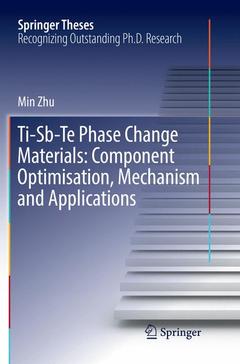Description
Ti-Sb-Te Phase Change Materials: Component Optimisation, Mechanism and Applications, Softcover reprint of the original 1st ed. 2017
Springer Theses Series
Language: English
Publication date: 12-2018
Support: Print on demand
Publication date: 05-2017
Support: Print on demand
Description
/li>Contents
/li>Biography
/li>Comment
/li>
This book introduces a novel Ti-Sb-Te alloy for high-speed and low-power phase-change memory applications, which demonstrates a phase-change mechanism that differs significantly from that of conventional Ge2Sb2Te5 and yields favorable overall performance. Systematic methods, combined with better material characteristics, are used to optimize the material components and device performance. Subsequently, a phase-change memory chip based on the optimized component is successfully fabricated using 40-nm complementary metal-oxide semiconductor technology, which offers a number of advantages in many embedded applications.
Acknowledge.- Abstract.- Introduction.- Component Optimization of Sb-Te in Ti-Sb-Te Phase Change Materials.- Component Optimization of Ti in Ti-Sb2Te3 Phase Change Materials.- Optimization Component Ti0.43Sb2Te3.- Influence of Temperature on Performance of Ti0.43Sb2Te3 Based Device.- Phase Change Mechanism of Ti0.43Sb2Te3 Alloy.- Ti0.43Sb2Te3 Based Phase Change Memory Chip.- Summary.- References.- Published Papers and Patents.- Bibliography.
Min Zhu received his B.Sc. in Electronics Science and Technology from Hubei University, China in 2009, and completed his Ph.D. in Microelectronics and Solid-State Electronics at Shanghai Institute of Microsystem and Information Technology, Chinese Academy of Sciences in 2014. His major research project in Prof. Zhitang Song’s group concerned a Ti-Sb-Te alloy for high-speed and low-power phase change memory. Subsequently, he received an Alexander von Humboldt Research Fellowship and became a post-doctoral fellow working with Prof. Matthias Wuttig at RWTH Aachen University, investigating the crystallization behavior of phase change materials.
These books may interest you

Thermophysical Properties and Measuring Technique of Ge-Sb-Te Alloys for Phase Change Memory 105.49 €

Thermophysical Properties and Measuring Technique of Ge-Sb-Te Alloys for Phase Change Memory 105.49 €

Ni-free Ti-based Shape Memory Alloys 220.63 €

